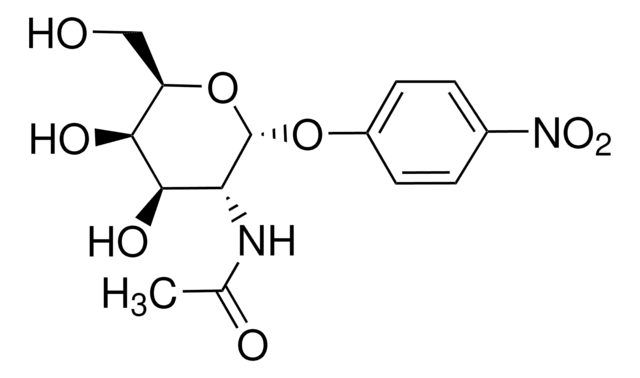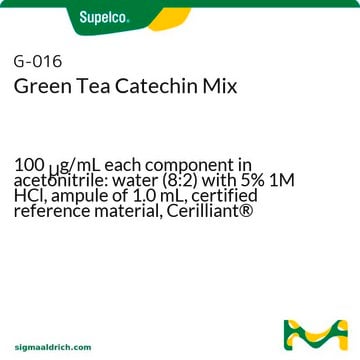Recommended Products
form
powder
application(s)
metabolomics
vitamins, nutraceuticals, and natural products
storage temp.
2-8°C
Other Notes
Extract containing mixture of polyphenolic compounds
Quality
Minimum 60% total catechins
Signal Word
Warning
Hazard Statements
Precautionary Statements
Hazard Classifications
Eye Irrit. 2 - Skin Irrit. 2 - STOT SE 3
Target Organs
Respiratory system
Storage Class Code
11 - Combustible Solids
WGK
WGK 3
Flash Point(F)
Not applicable
Flash Point(C)
Not applicable
Personal Protective Equipment
dust mask type N95 (US), Eyeshields, Gloves
Choose from one of the most recent versions:
Already Own This Product?
Find documentation for the products that you have recently purchased in the Document Library.
Customers Also Viewed
Sabrina M Noritake et al.
BMC complementary and alternative medicine, 17(1), 461-461 (2017-09-15)
Plants produce secondary metabolites that often possess widespread bioactivity, and are then known as phytochemicals. We previously determined that several phytochemical-rich food-derived preparations were active against pathogenic foodborne bacteria. Trichomonads produce disease (trichomoniasis) in humans and in certain animals. Trichomonads
Yu-Jin Kim et al.
International journal of molecular sciences, 21(14) (2020-07-12)
Although cell wall dynamics, particularly modification of homogalacturonan (HGA, a major component of pectin) during pollen tube growth, have been extensively studied in dicot plants, little is known about how modification of the pollen tube cell wall regulates growth in
Olivier Habrylo et al.
International journal of biological macromolecules, 112, 499-508 (2018-02-01)
Pectinases represent about one fifth of the enzyme worldwide market due their wide range of biotechnological applications. Current commercial pectinases are exclusively obtained from microbial sources, but here we report a pectin methylesterase (Sl-PME) and an endo-polygalacturonase (Sl-EPG) bioprospected from
Mélanie L'Enfant et al.
International journal of biological macromolecules, 81, 681-691 (2015-09-08)
Pectin methylesterases (PMEs) play a central role in pectin remodeling during plant development. They are also present in phytopathogens such as bacteria and fungi. We investigated the substrate specificity and pH dependence of plant and fungi PMEs using tailor-made pectic
Our team of scientists has experience in all areas of research including Life Science, Material Science, Chemical Synthesis, Chromatography, Analytical and many others.
Contact Technical Service













